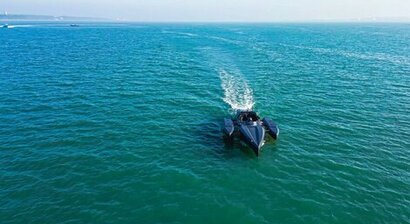
The electric trimaran was developed in partnership with Southampton Solent University and Newcastle Marine Services, under the UK Government’s Clean Maritime Demonstration Competition (CMDC3). The sea trials set out to explore the feasibility of zero-emission passenger ferries and revealed that the TriFoiler is five times cheaper to operate than an equivalent fossil fuel monohull vessel of the same size and displacement.
This in turn demonstrates clear potential for energy consumption reduction in commercial operations – with or without foils – as well as highlighting the suitability of the vessel for inland and inshore waterways ferry operations, such as the Solent and other categorised waters across the UK.
The project was part-funded by a £1.86 million grant via the UK SHORE programme – a Department for Transport (DfT) initiative – delivered by Innovate UK, part of UK Research and Innovation (UKRI).
“Successfully completing the TriFoiler project is a big milestone and testament to the team’s hard work” said Andy Page, Managing Director at Chartwell Marine. “The sea trial results clearly show that a trimaran, coupled with electric propulsion systems, will provide an efficient, reliable and environmentally friendly solution for the ferry industry. Working closely with Solent University and Newcastle Marine Services, we’ve taken this promising concept from R&D to real-world testing, and the results are encouraging. This was delivered by a dynamic, nimble team in a short time frame, and shows real commercial promise.”
Pairing a lightweight trimaran hull with electric propulsion, the TriFoiler achieves high efficiency and manoeuvrability at both high and low speed. Its enhanced stability, made possible by the trimaran configuration and foil-mounted electric motors positioned widely on the foil, offers a simple, robust design, using commercial off the shelf equipment that has the potential to meet the demands of day-to-day commercial operations.
“The project exemplifies how collaboration between academia and industry can accelerate innovation” added Giles Barkley, at Southampton Solent University. “We created a full-size digital twin of the vessel to replicate its performance on water at the university. Now validated with data from the trials, this enables us to enhance future designs while also supporting the training and development of the next generation of naval architects.”
Chartwell Marine will exhibit the TriFoiler at Seawork 2025, taking place from June 10th-12th in Southampton. Following the event, further testing will resume on the vessel incorporating the latest findings to inform the next stage of development.
For additional information:

